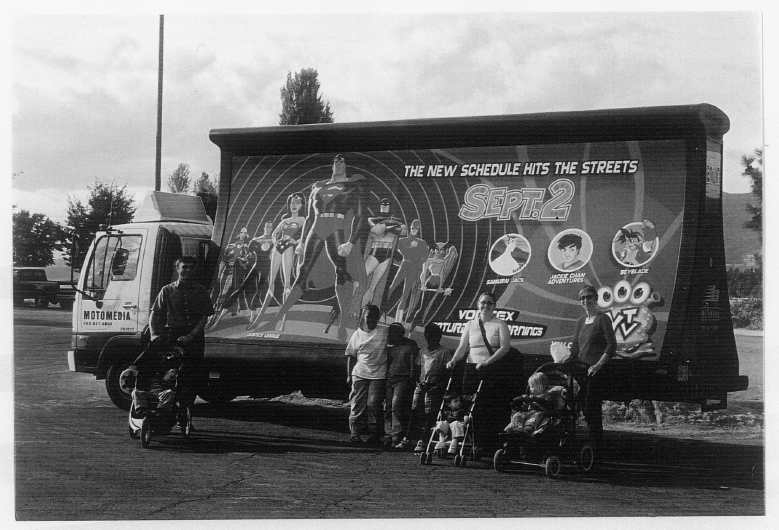
Vancouver City Council |
ADMINISTRATIVE REPORT
Date: June 18, 2003
Author/Local: N.Hood/604-873-7741
RTS No. 03473
CC File No. 2851
Meeting Date: July 10, 2003
TO:
Standing Committee on City Services and Budgets
FROM:
General Manager of Engineering Services
SUBJECT:
Motomedia - Mobile Billboard Advertising
RECOMMENDATION
THAT Council deny Motomedia's request to operate mobile billboard trucks in the City of Vancouver.
POLICY
Street and Traffic By-law No. 2849 does not allow any person to 'operate or stand or park on any street any vehicle for the sole or primary purpose of displaying advertising, without first having obtained permission therefor from Council.'
License By-law No. 4450 states no 'person shall carry on within the City any business, trade, profession or other occupation without holding a subsisting City license therefor.'
PURPOSE
Motomedia is seeking Council's permission to operate mobile billboard trucks in the City of Vancouver.BACKGROUND
In January 2001, Motomedia approached the Vancouver Police Department seeking exemption from Street and Traffic By-law No.2849 Section 81. (1) in order to operate mobile billboard trucks. This section of the by-law prohibits vehicles from carrying advertising devices of a temporary nature and Motomedia was advised at the time that Section 81. (1)didnot apply to their operation. As a result, Motomedia continued operating their mobile billboard advertising business along with their community outreach efforts and special courier delivery services.
In November 2002, City engineering staff observed Motomedia trucks on City streets and advised Motomedia they were operating in contravention of Section 81 (2) of the Street and Traffic By-law, which prohibits the operation of a vehicle for the sole or primary purpose of advertising, unless approved by Council. They were asked to cease operations until such time as permission from Council was granted and a business license was obtained.
DISCUSSION
Motomedia's website promotes its ability to capture target audiences and meet the strategic needs of its clients by customizing the timing and focus of routes taken by its trucks. They offer to take full advantage of trendy populated areas, special events and rush hour traffic. They contract with an engineering firm to provide statistical proof of the impact that their mobile media campaigns deliver. A photograph of a Motomedia truck is attached as Appendix A.
When not actively engaged in a media campaign, Motomedia uses its trucks for special courier deliveries and to provide services to community and charitable groups. The design of the trucks, two large concave billboards mounted on a flatbed, limits the type of goods which can be delivered by the truck. Their community outreach typically consists of delivery of water or clothing and blankets to homeless organizations.
ENVIRONMENTAL IMPLICATIONS
The use of a truck to deliver advertising is not seen by staff as an environmentally sustainable activity. Motomedia uses a biodiesel fuel in its Ontario operations, but this fuel alternative is not yet available in Vancouver. Regardless, the use of the biodiesel is a supplement to standard fossil fuels and reduces emissions of carbon dioxide by 13% to 43% and greenhouse gases by 16% to 78%, according to Motomedia's website. The theory behind delivery of a high impact media campaign necessitates planning routes with high traffic volumes, thus contributing to vehicle congestion and pollution.
The use of Motomedia's trucks to deliver goods on behalf of community groups is also not seen as sustainable. The type and quantity of goods could easily be delivered by a much smaller vehicle such as a van or one ton panel truck, with less vehicle emissions.
Finally, the mobile billboards are seen as an unwelcome intrusion into the public realm. They contribute to the visual pollution of the urban environment without providing the benefit of simultaneous movement of goods or people.
CONCLUSION
Motomedia's promotional materials present their company as providers of strategically planned and targeted media campaigns. They conduct supplementary activities, such as, specialty courier deliveries and charitable work outside of campaign hours. However, their primary business activity is the display of advertising on trucks which are driven on preplanned routes through busy areas. This is in contrast to companies whose main business activity is the transport of goods or people who supplement their business activity with display advertising on the inside or outside of their vehicles.
Given the nature of Motomedia's business operations they are required under the Street and Traffic By-law to obtain Council's permission to operate in the City of Vancouver. This report recommends that Council not grant such permission, given the negative impacts that would result on air quality and aesthetics in the public realm.
* * * * *
Appendix A
